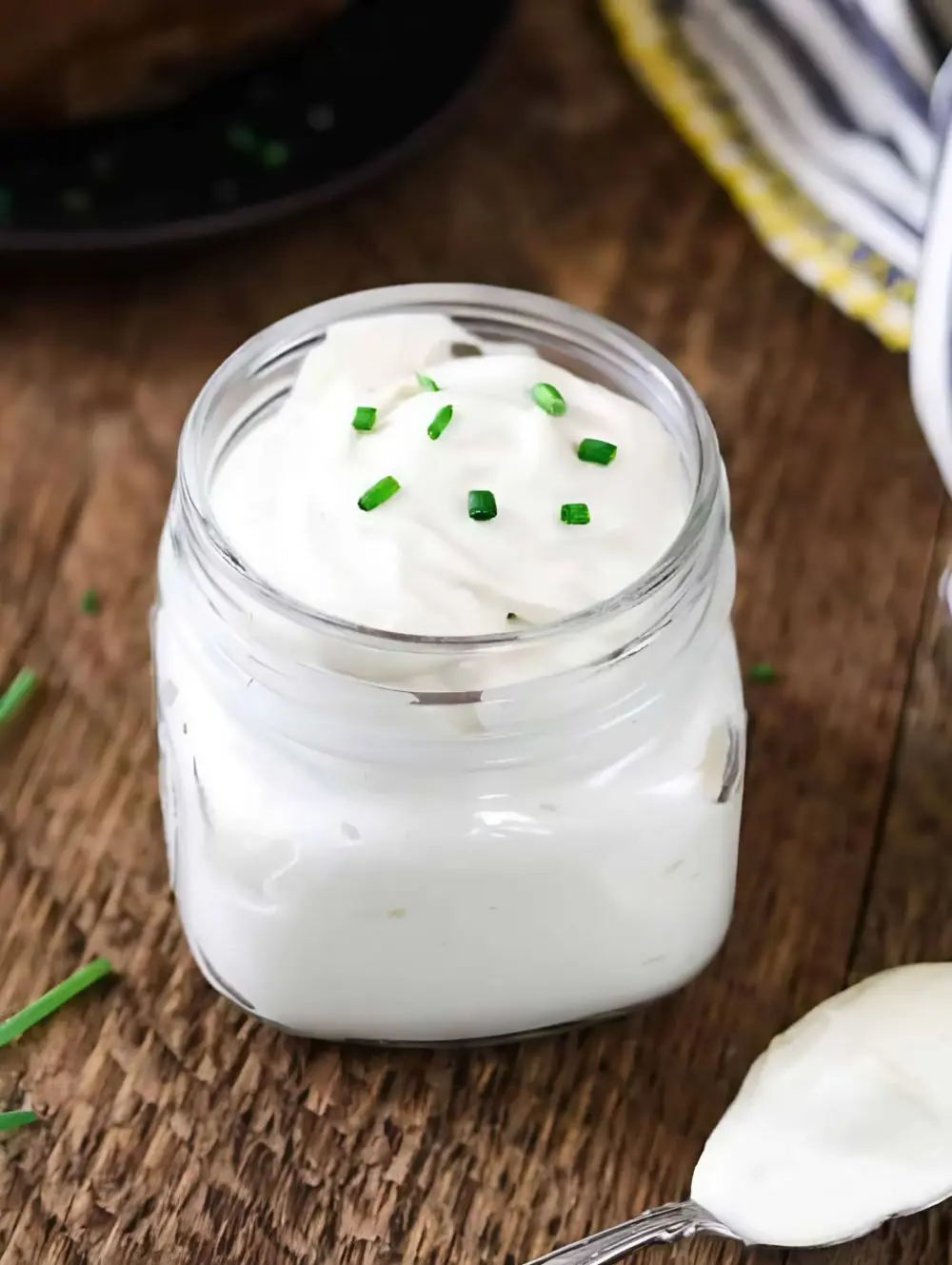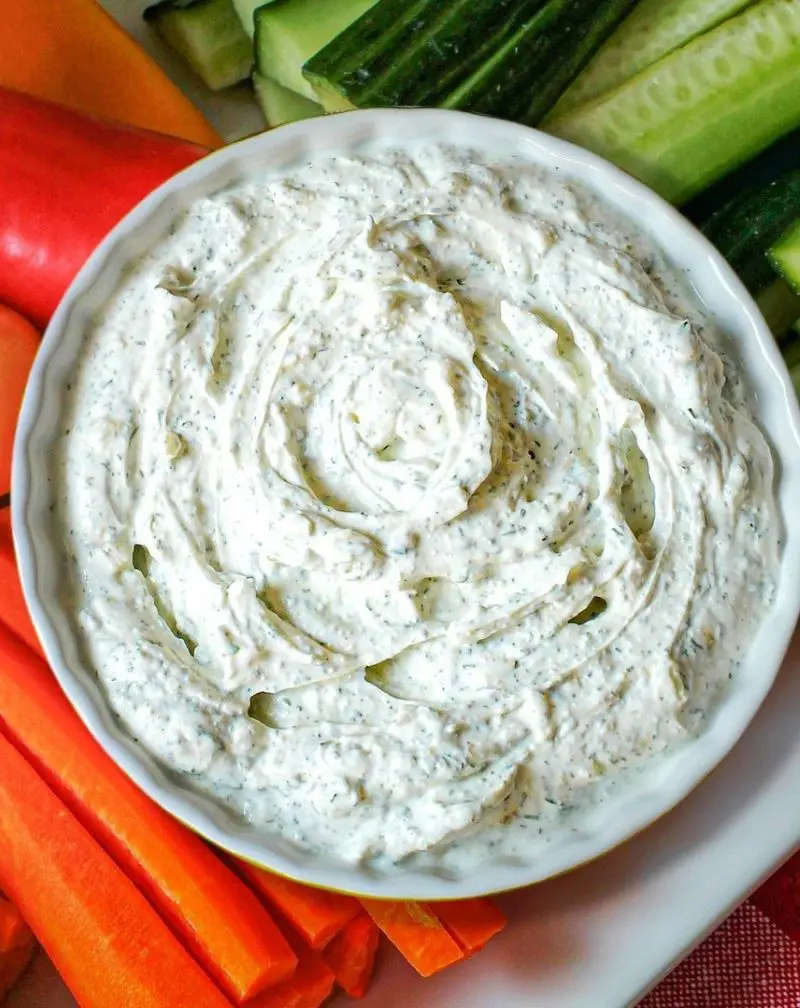Sour Cream Nutrition And 16 Health Benefits

Sour cream is a dairy product made by fermenting regular cream with lactic acid bacteria, which thickens the cream and imparts a tangy flavor. It is commonly used as a topping for baked potatoes, tacos, and chili, and as an ingredient in dips and dressings.
While sour cream adds flavor and creaminess, it is high in fat and calories, so moderation is important. When consumed in small amounts, it can be part of a healthy diet. In this discussion, we explore sour cream nutrition and the health benefits it offers.
Sour Cream Nutritional Information

Sour cream is rich in essential nutrients, but due to its typically small serving size, it doesn't provide substantial amounts of any particular nutrient. According to the USDA, the nutritional content for a 2-tablespoon (30-gram) serving of regular sour cream is as follows:
- Calories: 59.4
- Protein: 0.732 g
- Carbohydrate: 1.39 g
- Total Fat: 5.8 grams
- Saturated Fat: 3 grams
- Calcium: 30.3 mg
- Iron: 0.021 mg
- Magnesium: 3 mg
- Phosphorus: 22.8 mg
- Potassium: 37.5 mg
- Selenium: 1.11 µg
- Folate: 1.8 µg
- Vitamin A: 37.2 µg
- Vitamin B2 (riboflavin): 0.05 mg
- Vitamin B12: 0.063 µg
- Choline: 5.76 mg
Carbs
Sour cream is high in calories yet low in carbohydrates, with approximately 59.4 calories per two-tablespoon serving and only 1.39 grams of carbohydrates, derived from natural sugars. Its glycemic index is estimated at around 56, classifying it as a low to moderate glycemic food.
Considering its small serving size, the glycemic load of a 2-tablespoon serving is estimated to range between 0 and 1. Glycemic load takes into account portion size when evaluating a food's effect on blood sugar levels.
Fats
Regular sour cream contains 5.8 grams of fat, with nearly 3 grams being saturated fat and the rest consisting of monounsaturated and polyunsaturated fats. Fat-free sour cream contains no fat but has a higher carb content, around 5 grams. Light sour cream, on the other hand, typically provides about 3.4 grams of fat.
Calories
Because of its fat content, sour cream tends to be relatively high in calories. A serving of regular sour cream contains approximately 59.4 calories per 2-tablespoon serving. Fat-free sour cream contains around 23 calories per serving, while light sour cream has about 43 calories.
Protein
A serving of regular sour cream doesn't offer much protein, providing less than one gram.
Sour Cream Health Benefits
Although sour cream shouldn't be your main nutrient source, it can still contribute to your health in various ways. It provides essential nutrients such as calcium, phosphorus, and vitamin B12, which play crucial roles in supporting bone health, energy production, and more. Let's delve into some potential health benefits.
1. Promotes Heart Health

While sour cream does contain saturated fats, which in excess can be detrimental to heart health, the overall impact depends on various factors such as portion size, frequency of consumption, and the individual's overall dietary pattern.
The fats in sour cream can increase levels of HDL (good) cholesterol, which may help protect against heart disease when consumed as part of a balanced diet that includes other heart-healthy foods such as fruits, vegetables, and lean proteins. However, choosing lower-fat varieties and consuming sour cream in moderation is essential.
2. Helps Protect Your Bones and Teeth

Packed with calcium and phosphorus, sour cream aids in maintaining strong bones and teeth. Calcium is vital for bone health and can help prevent conditions like osteoporosis and fractures. Together with vitamin D, it ensures optimal bone density.
Phosphorus, the body's second most abundant mineral, is essential for bone formation, energy production, and protein synthesis.
3. Aids Digestion
Sour cream aids digestion primarily through its probiotic content, especially in varieties labeled as containing live and active cultures. Probiotics are beneficial bacteria that help maintain a healthy balance of gut flora, which is essential for efficient digestion and nutrient absorption.
These good bacteria can prevent digestive issues such as constipation, bloating, and diarrhea by inhibiting the growth of harmful bacteria. Additionally, a balanced gut microbiome supports overall digestive health and enhances the immune system, contributing to better overall wellness.
4. Supports Weight Management
When consumed in moderation, sour cream is unlikely to significantly affect your body weight and may even aid in weight loss. The combination of fats and proteins in sour cream helps you feel full for longer, which can reduce overall calorie intake by curbing overeating and snacking between meals.
Opting for low-fat or light versions offers these benefits with fewer calories. When included in a balanced diet with fruits, vegetables, whole grains, and lean proteins, sour cream can enhance meal satisfaction and support weight management efforts.
5. Good for Eye Health

Sour cream supports eye health through its vitamin A content. Vitamin A is essential for maintaining good vision, particularly in low-light conditions. It is a key component of rhodopsin, a protein in the eyes that allows you to see in dim light.
Additionally, vitamin A helps protect the cornea, the eye's surface, and supports overall eye health by reducing the risk of age-related macular degeneration and other eye conditions. Including sour cream in a balanced diet can help contribute to your daily vitamin A needs.
6. Low in Carbs
While there's nothing inherently wrong with carbs, it's true that low-carb diets are quite popular. Many people may be pleased to know that sour cream is relatively low in carbohydrates.
A standard serving (2 tablespoons or 30 grams) typically contains about 1-2 grams of carbs, making it suitable for low-carb and ketogenic diets when consumed in moderation. However, it's essential to check the nutritional label for specific brands, as carbohydrate content can vary slightly.
7. May Improve Skin Health

Sour cream may contribute to improved skin health due to its vitamin A and E content, which support skin repair and protection from free radicals. Additionally, the lactic acid in sour cream can act as a gentle exfoliant, promoting smoother skin when used topically.
Some people use sour cream as a natural moisturizer or face mask to hydrate and nourish the skin, although individual results may vary. It's important to patch-test any new skincare products or ingredients to ensure they are suitable for your skin type.
8. May Improve Cardiovascular Health
When consumed in moderation as part of a balanced diet, sour cream can contribute to cardiovascular health. While it contains saturated fats, which can increase LDL (bad) cholesterol levels, it also provides essential nutrients like calcium, phosphorus, and vitamins A and B12.
Additionally, the fats in sour cream can raise levels of HDL (good) cholesterol, which helps remove LDL cholesterol from the bloodstream, reducing the risk of heart disease. Choosing low-fat or light versions of sour cream can further support cardiovascular health by reducing overall saturated fat intake.
9. Helps Prevent Vitamin B12 Deficiency
One significant health benefit of sour cream is its high vitamin B12 content. Vitamin B12, found in animal products and fortified plant-based foods, is essential for DNA synthesis, red blood cell production, and brain function. It helps the body metabolize proteins, enzymes, and other nutrients.
Since B12 is naturally present in meat, fish, dairy, and eggs, vegetarians and vegans are more susceptible to deficiencies. For those who avoid cheese and fatty meats, sour cream serves as a beneficial source of this vital nutrient.
10. May Promote Absorption of Fat-Soluble Vitamins

Certain vitamins need a source of fat to be absorbed effectively in your digestive tract. These fat-soluble vitamins include A, D, E, and K. Deficiencies in these vitamins are linked to diseases such as cancer, diabetes, and immune disorders.
While fat-soluble vitamins are present in various healthy foods like fruits and vegetables, these foods often lack fat. Consuming them with a fat source can improve absorption. Regular sour cream, being primarily composed of fat, can help enhance the absorption of these essential vitamins.
11. Some Varieties Contain Probiotics
Probiotics are live microorganisms that can improve digestion and enhance immune function when consumed. Traditionally, sour cream is made by fermenting dairy cream with lactic acid bacteria, a common type of probiotic used in food production.
Therefore, some types of sour cream may contain probiotics. However, most commercially available sour cream is pasteurized to prevent foodborne illness, which destroys the live bacteria. To counter this, some brands reintroduce these beneficial microbes after pasteurization, ensuring you still receive the probiotic benefits.
12. Can Help You Eat More Vegetables
Using sour cream as a tasty and versatile accompaniment can help you eat more vegetables. Its creamy texture and tangy flavor can enhance the taste of vegetables, making them more appealing.
You can use sour cream as a dip for raw veggies, mix it into salads, or add it as a topping for cooked vegetables. Additionally, incorporating sour cream into dressings, sauces, and spreads can make vegetable dishes more enjoyable, encouraging you to include more vegetables in your diet.
13. Improves Mood
Sour cream contains vitamin B12, which plays a crucial role in producing neurotransmitters that regulate mood and mental function. Adequate levels of vitamin B12 are associated with a lower risk of depression and improved cognitive health.
The fats in sour cream contribute to the production of hormones that can positively affect mood. Including sour cream in a balanced diet can support overall mental well-being, contributing to a more stable and positive mood.
14. Energy Boosting

Sour cream is a good source of essential fats and proteins, which are crucial macronutrients that provide sustained energy. The fats in sour cream are a dense energy source, offering a quick energy supply for the body.
Also, the protein content helps maintain and repair body tissues, supporting overall energy levels. The B vitamins in sour cream, such as riboflavin (B2) and vitamin B12, also play a role in converting food into usable energy, further contributing to an energy boost.
15. Good Source of Healthy Fats
Sour cream can be considered a source of healthy fats, particularly if you opt for varieties that are lower in saturated fats. While sour cream does contain saturated fats, which should be consumed in moderation, it also contains unsaturated fats, including monounsaturated and polyunsaturated fats.
These unsaturated fats are considered heart-healthy and can help improve cholesterol levels when consumed as part of a balanced diet. Nevertheless, it's important to be mindful of portion sizes and choose lower-fat versions of sour cream when possible to limit saturated fat intake.
16. Can Fit A Keto Diet

Sour cream is keto-friendly because it is low in carbohydrates, containing typically only 1-2 grams of carbs per serving (30 grams). Since the ketogenic diet focuses on consuming high-fat, moderate-protein, and low-carb foods to induce a state of ketosis, sour cream fits well within these parameters.
It provides a source of healthy fats and can be used in various keto-friendly recipes, such as dips, sauces, and dressings for keto-friendly meals. However, it's essential to check the nutritional label and choose sour cream without added sugars, as some varieties may contain added carbohydrates.
Recent posts
Nutrition
Nutrition
Licorice Root: Benefits And Uses
You can spell it liquorice or licorice; this herb or root has been in use for centuries in most medicinal applications, as a natural sweetener and to enhance flavors. Regarding its origins, it comes from the root of the "Glycyrrhiza galbre" plant and...
Nutrition
Is Salmon Good For You? Nutritional Facts and Benefits
Salmon fish is a staple diet throughout the world, popular as a super food for its nutrients. Whether savored in sushi, poached, grilled, roasted, or pan-fried, salmon offers minerals and vitamins that contribute to healthy bodily functions. In addit...
Nutrition
25 Smoked Salmon Recipes That You Will Enjoy
Salmon is a silver-colored fish that is loaded with many nutrients, vitamins, and omega-3 fatty acids. Smoked Salmon is better for improving your health and reducing the risk of cancer, heart-related diseases, fights inflammation, reduces anxiety and...
Nutrition
Are Sausages Healthy? Nutrition And Health Benefits
Sausages are tasty in an addictive way, making them one of the most popular foods worldwide. You may have enjoyed this convenient food often, whether on a bun with mustard or grilled on a barbecue, the simple preparation methods are what makes its co...
Nutrition
20 Vegetables That Are Rich In Iron
Iron is essential for our bodies to function well. When we don't get enough iron, we often feel weak and tired. It's important to address iron deficiency early by eating the right foods. Fortunately, many vegetables are rich in iron and can help prev...
Nutrition
15 Cauliflower Nutrition Facts And Health Benefits
Cauliflower, a cruciferous vegetable, resembles a white variation of its relative, broccoli. Like broccoli, it has closely bunched florets attached to a thick core, often surrounded by a few leaves. While white is the most common color, cauliflower i...







